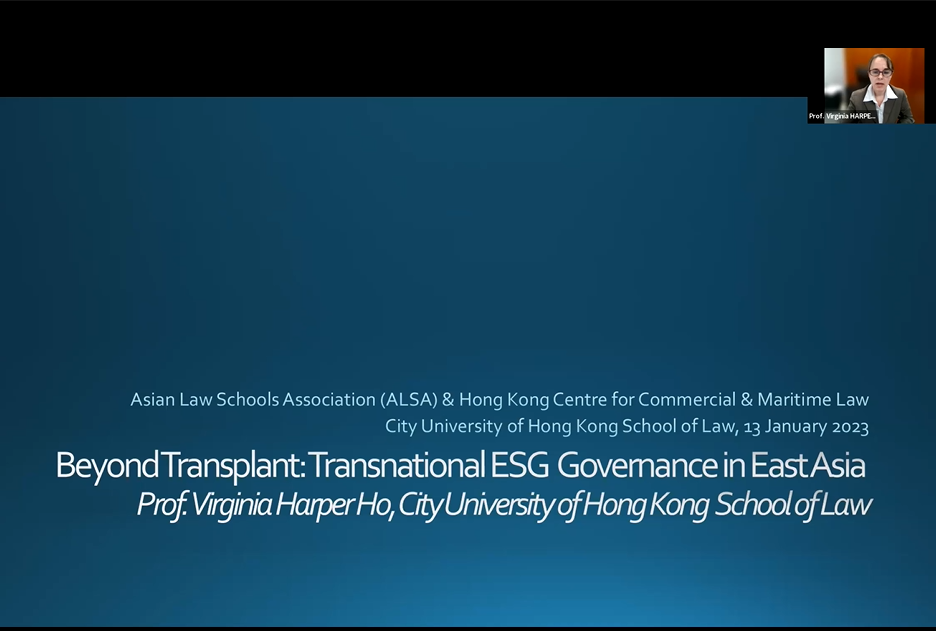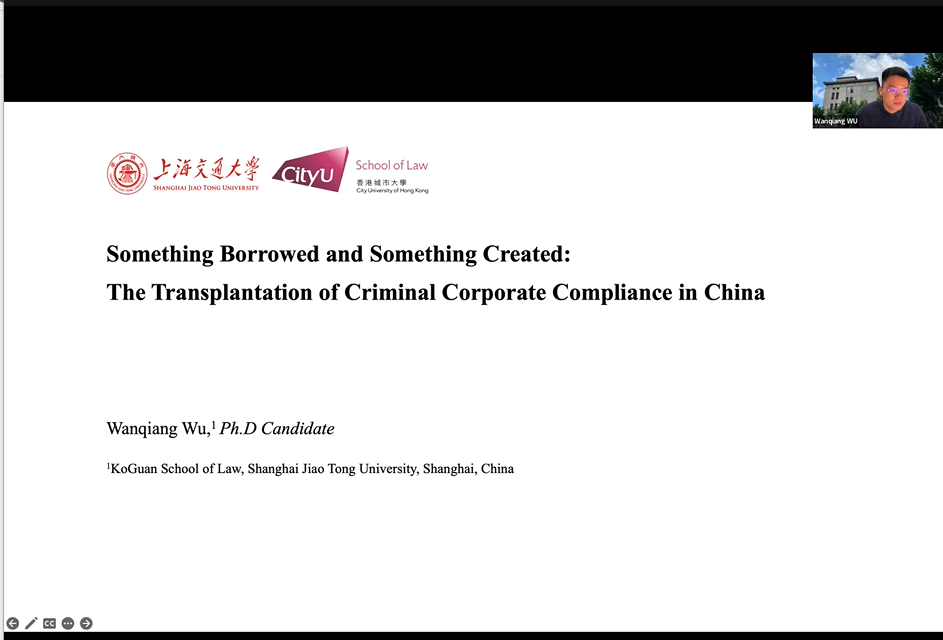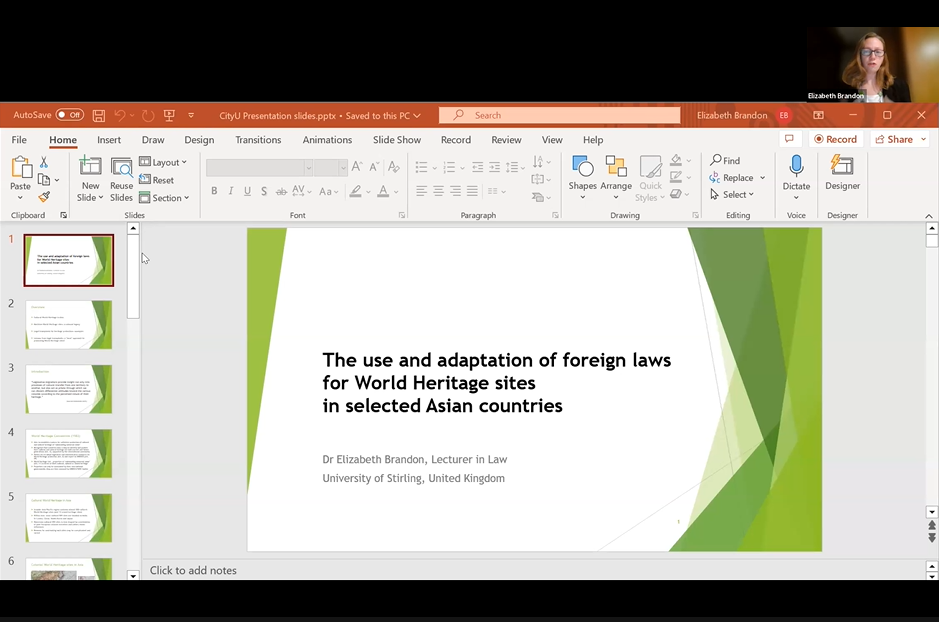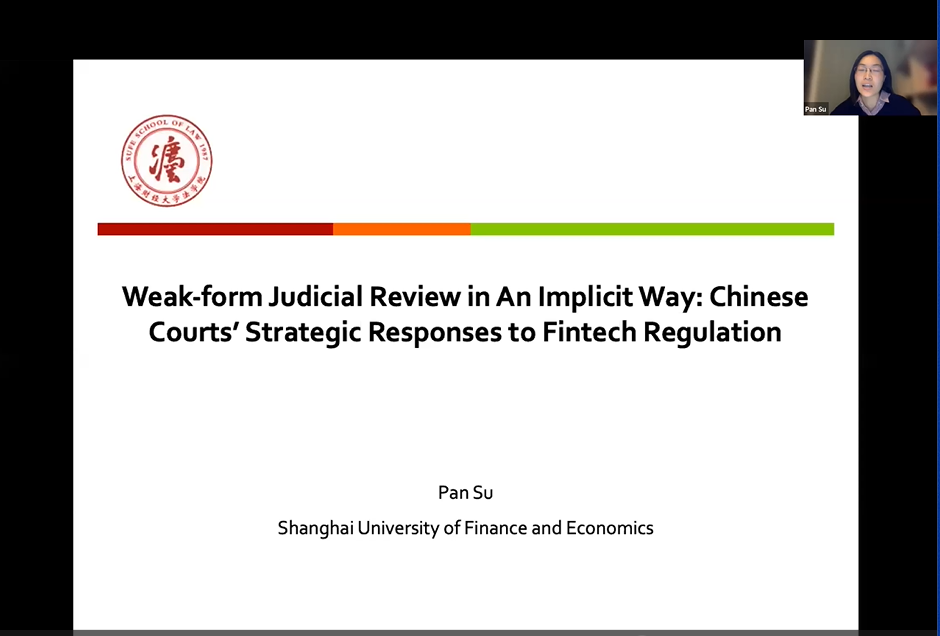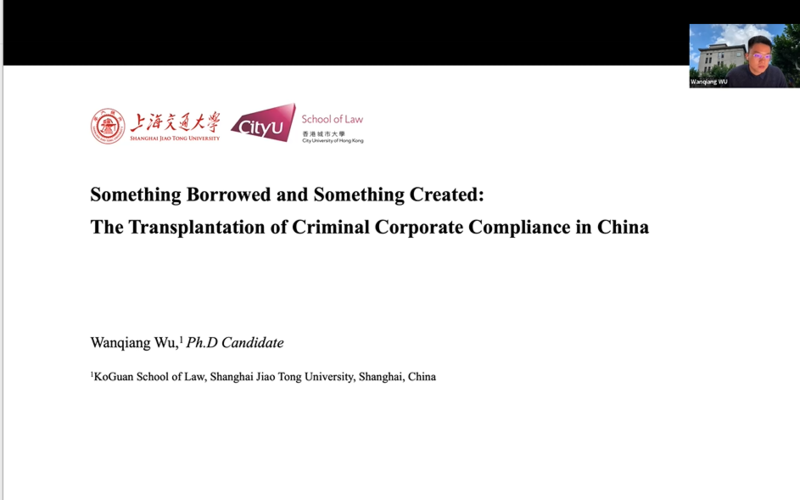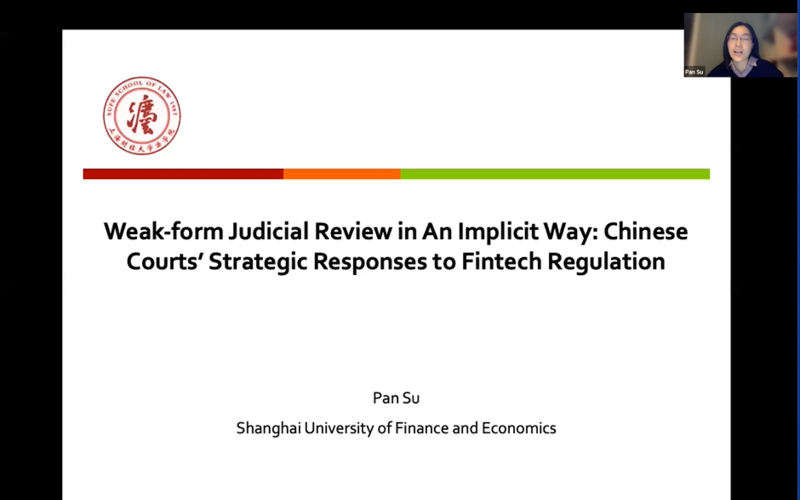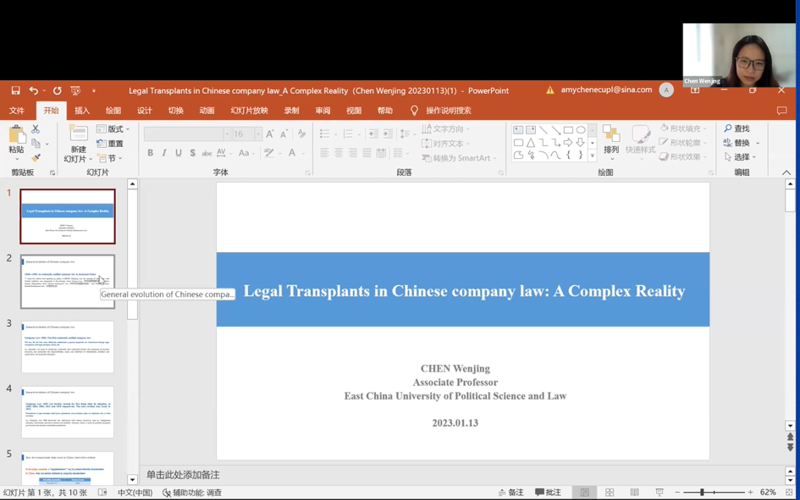Latest News
ALSA - HKCML Joint Conference: Transplantation of Foreign Law and the Creation of Unique Legal Solutions in Asian Legal Systems
Legal systems develop, sometimes through the borrowing of foreign laws and institutions, sometimes through developing unique solutions. Even when foreign laws and institutions are borrowed and transplanted, there is invariably adaptation and transformation. The online conference on 13 January 2023 brought together scholars who investigate the phenomena of legal transplants, the development of legal innovations, their interactions, and how they affect development of legal systems.
Panel A began with a paper by Prof. Virginia Ho (Professor, City University of Hong Kong School of Law) entitled “Beyond Transplants: Transnational ESG Governance in East Asia.” Prof. Ho observed how transnational actors, such as the G20 Financial Stability Board, are developing norms for climate risk managements, and these norms are now stimulating legal reform is East Asia. These reforms often contain unique accents and contain novel elements. Interestingly, even as external norms stimulate the legal transplantations and innovations, the developments in East Asia in turn reinforce the innovations in other regions. In “Legal Transplants in Chinese Company law: A Complex Reality,” Dr Wenjing Chen (East China University of Political Science and Law) spoke on how Chinese Company Law transplanted legal concepts such as the derivate action and the directors’ duty of care. Noting divergence in how the transplanted rules operate in China and how they operate in the host jurisdictions, Dr Chen argued that close attention should be paid to how the rules are interpreted and applied by the judges, and that it is insufficient merely to borrow legal rules and norms. Mr Wanqiang Wu (Shanghai Jiao Tong University, KoGuan School of Law) gave a presentation on “Something Borrowed and Something Created: The Transplantation of Criminal Corporate Compliance in China.” Direct borrowing from major Western criminal corporate compliance models does not work for China. The same goes for criminal law and criminal procedural law. Mr Wu explored why considering the ideas, values and existing institutions of the transplant jurisdictions are necessary to create unique and suitable legal solutions. In “Adapting Traditional Chinese Legal Culture to Westernised Property Law: A Comparative Study of Mainland China, Hong Kong, and Taiwan,” Dr Alvin Hoi-Chun Hung (Australian National University, ANU College of Law) found that although these three jurisdictions share the same traditional culture, their legal systems are rooted in different legal traditions. He explored how this accounts for the differences and how the three jurisdictions deal with the conflict between traditional customary and transplanted western legal concepts.
Panel B started with a presentation by Dr Elizabeth Brandon (University of Stirling, Faculty of Arts and Humanities, Law and Philosophy) on “The use and adaptation of foreign laws for World Heritage sites in selected Asian countries.” Dr Brandon compared the transplanted legislation on World Heritage Sites in India, Sri Lank and Malaysia and analysed the tension between local needs and foreign law, and how the international guidelines in World Heritage protection legislation were tailored to accommodate local needs. In “Weak-form Judicial Review in An Implicit Way: Chinese Courts’ Strategic Responses to Fintech Regulation,” Dr Pan Su (Shanghai University of Finance and Economic, Law School) found that rather than reviewing the legality of P2P Regulation, Chinese judges review the applicability of the P2P Regulation. By such implicit review, Chinese courts balance the administrative power and the private autonomy protection. Finally, Ms Marianne von Blomberg (University of Cologne, Institute of East Asian Studies – Chinese Studies, Faculty of Arts and Humanities, Chinese Legal Culture) spoke on “Innovating Administrative Law for the Data Era or Undermining Legal Principle? The Social Credit System Through the Lens of Chinese Legal Literature.” Ms Blomberg provided an insightful analysis of the Social Credit System, an innovative data-driven regulatory system, and the potential conflicts with existing legal framework and principles.
法律體系的發展,有時是透過借鑒外國法律和製度,有時是通過制定獨特的解決方案。即使借鑒和移植外國的法律和製度,也不可避免地要經過適應和改造的過程。2023 年 1 月 13 日的綫上研討會,與會學者對法律移植、法律創新發展以及二者之間的相互作用進行討論。
第一部分以Virginia Harper Ho教授(香港城市大學法學院教授)題爲「不止移植:東亞的跨國ESG治理」的論文開始。她觀察G20金融穩定委員會等跨國組織如何制定氣候風險管理規範,這些別具一格且包含創新元素的管理規範正在促進東亞的法律改革。值得關注的是,當外部法律規範促進法律移植和創新的同時,東亞的法律發展也反過來影響其他地區的法律發展。在題爲「中國公司法的法律移植:一個複雜的現實」的文章中,Wenjing Chen博士(華東政法大學法治戰略研究中心)討論了中國公司法中的法律移植,她以衍生訴訟和董事的勤勉義務為例展開討論。她在觀察到移植的規則在中國的運作方式與其在原本的司法管轄區含義以及運作方式的差異后,認爲在法律發展的過程中,不能單純的借用外來的法律規則,而更應該關注法官如何解釋和適用這些外來的規則。Wangqiang Wu先生(上海交通大學,凱原法學院)發表了題爲「借鑒與創新:刑事合規在中國的移植」的報告。直接借用西方的企業刑事合規經驗不能適應中國的刑事法律體系,無論是刑法還是刑事訴訟法。他探討了綜合考慮移植司法管轄區的理念、價值觀和現有製度的必要性,以製定獨特而合適的法律解決方案。Alvin Hoi-Chun Hung 博士(澳大利亞國立大學法學院)在題爲「使中國傳統法律文化適應西化財產法:中國大陸、香港和台灣的比較研究」的文章中,提到儘管這三個司法管轄區擁有相同的傳統文化,但三者的司法律體系植根於不同的法律傳統的外國法律制度。他探討了不同的外國法律傳統如何導致差異以及這三個司法管轄區域如何分別如何處理傳統習慣與移植的西方法律概念的衝突。
第二部分以Elizabeth Brandon 博士(斯特林大學藝術與人文、法律與哲學學院)題爲「亞洲國家在保護世界遺產規範中對外國法律的適用」的論文開始。她對比了印度、斯里蘭卡以及馬來西亞在世界遺產保護方面的法律移植,並分析了世界遺產保護的本地需求與外國法之間的衝突以及世界遺產保護的國際指南如何適應本地需求。在題爲「隱秘的弱式司法審查——中國法院如何戰略性應對金融科技法規」一文中,Pan Su博士(上海財經大學法學院)發現,中國的法官並不審查P2P法規的合法性,而審查P2P法規的適用性。透過這種隱性審查,中國的法官平衡了行政權力以及個人自治權的保護二者閒的關係。最後,Marianne von Blomberg 女士(科隆大學,東亞研究所 - 中國研究,藝術與人文學院,中國法律文化)介紹了題爲「數據時代創新行政法還是破壞法律原則?中國法律文獻視角下的社會信用體系」的論文,她對社會引用體系這一創新的數據驅動監管體系以及其與現行法律框架及原則的潛在衝突進行了深入的分析。
